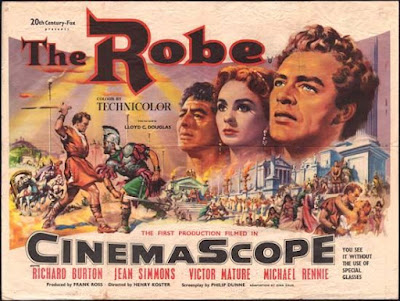Based on a 1942 novel by Lloyd C. Douglas, “The Robe” is a mixture of Biblical account and myth, told from the perspective of Roman military tribune Marcellus Gallio (Richard Burton), who is just sort of wandering through a slave market as the movie opens, taking in the sights and sounds, a chance to show off that Cinemascope. And Burton’s disinterested air here, hardly tempted with so many temptations surrounding him, evince the character’s drunken, spoiled (he’s the son of a senator) air. At the same time, however, when Marcellus re-encounters his childhood sweetheart Diana (Jean Simmons), now pledged to Emperor Caligula (Jay Robinson), Burton cannot transcend that rotted air to evince anything like romance and neither can Simmons. There the widescreen images only seem to emphasize the palpable dead air between them. Hot or not, Caligula still schemes to send Marcellus away, lest he interfere with his would-be marriage, dispatching the tribune to some backwater called Jerusalem.
That is where Marcellus will oversee the crucifixion of one Jesus, never seen in full, always obscured, like by the cross he is made to drag up Calvary Hill, or out of the frame entirely, a way to underscore just how little he seems to mean to this military tribune. Indeed, as Jesus is nailed up on the cross, bleeding out, Marcellus plays a game of dice behind him, which might be how picnickers looked at the Battle of Bull Run. Marcellus wins Jesus’s robe rolling dice and after the Nazarene dies, he feels some sort of mystical pull toward the Christian faith. Such histrionics might be meant as counterpoint to the movie’s overall austere sense but are not always effective. When Marcellus’s Greek slave Demetrius (Victor Mature) encounters Judas, a strike of thunder so uber-thunderous sounds when the apostle says his name that it seems as if “The Robe” has inadvertently wandered onto a Mel Brooks set. What’s more, this wind and wrack, never mind the magical powers of Jesus’s Robe itself, seem to compel Marcellus more than any theology, inadvertently underlining Rome’s accusations that Christianity is just sorcery and unintentionally suggesting that Marcellus has merely been swept up on some kind of magic carpet ride. Come to think of it, maybe that’s why they never showed it in my Sunday school class.
That is where Marcellus will oversee the crucifixion of one Jesus, never seen in full, always obscured, like by the cross he is made to drag up Calvary Hill, or out of the frame entirely, a way to underscore just how little he seems to mean to this military tribune. Indeed, as Jesus is nailed up on the cross, bleeding out, Marcellus plays a game of dice behind him, which might be how picnickers looked at the Battle of Bull Run. Marcellus wins Jesus’s robe rolling dice and after the Nazarene dies, he feels some sort of mystical pull toward the Christian faith. Such histrionics might be meant as counterpoint to the movie’s overall austere sense but are not always effective. When Marcellus’s Greek slave Demetrius (Victor Mature) encounters Judas, a strike of thunder so uber-thunderous sounds when the apostle says his name that it seems as if “The Robe” has inadvertently wandered onto a Mel Brooks set. What’s more, this wind and wrack, never mind the magical powers of Jesus’s Robe itself, seem to compel Marcellus more than any theology, inadvertently underlining Rome’s accusations that Christianity is just sorcery and unintentionally suggesting that Marcellus has merely been swept up on some kind of magic carpet ride. Come to think of it, maybe that’s why they never showed it in my Sunday school class.
“The Robe”, however, is never as entertaining as the phrase magic carpet ride makes it sound. Even when the movie drifts into Robin Hood territory, with Marcellus playing prince of thieves, so to speak, Diana as Maid Marian, and Caligula as Prince John (Robinson’s performance even suggests a more hysterical Claude Rains), it never matches the suddenly merry musical score, still just a drag. And the conclusion, in which a couple characters take up Jesus’s promise of meeting him in paradise, fails to render the immense dreamlike sensation it suggests, leaving me, I swear, to imagine a David Lynch Biblical epic instead. They couldn’t have shown that one in Sunday school either. Maybe that would be more of a Midnight Mass movie.





No comments:
Post a Comment